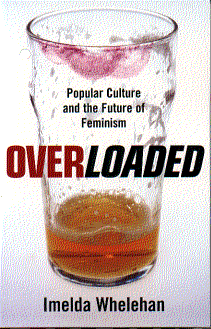Firstly.
Just some ways in which the media restrict women and whatnot
"Just look at how women are presented in the media. It's not just about stereotypes.
1) Women have been allocated a limited range of roles
2) Women are less visible in the media than men (After all, in a patriarchal society, they're inferior)
3) Women have been presented as ideals - Ferguson's "cult of femininity" still exists -
4) Women have been selected to appeal to men etc etc
Female issues are marginalised by the media. To use Tuchman's words, women are "symbolically annihilated" by the media.
If there wasn't a patriarchy, why would women be presented like this by the media, which, by the way, I personally believe is an incredibly powerful institution.
I personally believe that traditional images are deliberately transmitted by male-dominated media to keep women in a narrow range or roles, thus reproducing patriarchy."
(This can also double up as a bit of sociology revision, how fun!)
1) Women have been allocated a limited range of roles (in the media)
Social roles for women. There ain't that many of them in the media. Men, however, perform a myriad, the full range even, of social and occupational roles. Women are often found in domestic settings (stereotypical of what?!), as busy housewives, contented mothers, eager consumers, and so on. True, there are some examples where women are more than this. But very often, these women are also mothers/wives/whatever, or desire to be these things. Sexual and romantic roles are also included in this list. Because what more could a woman want in her life, other than to fulfil a sexual, romantic or domestic role? (Yes, yes, I know, many women do want this, but I'm just exploring the possibility that a woman could possibily want more, like, for example, maybe, just maybe, a career, or something?!)
Even when women are in high-status occupational roles - doctors, lawyers - they are often shown as having problems with their "unusual" circumstances. They are portrayed as unfulfilled (with motherhood often being offered as a solution to this), unattractive, unstable, having problems with relationships. Successful working mothers are shown as irresponsible, even as bad mothers emotionally neglecting their children. Men are rarely shown in such a light.
Examples of these successful women? Take Lynette from Desperate Housewives - she felt guilty when she got back into a career, Parker (her youngest son) even created an imaginary Mary Poppins like friend to fill the void left o so cruelly by his mother, to represent the disturbing change in his life - or, Elliot from Scrubs. Neurotic as hell, increasingly so as she gets more successful. (That said, I do love both programmes.)
2) Visibility
In 1990, 89% of voice-overs for television commercials were male, because apparently male voices are more representative of authority, while women were the main stars of only 14% of mid-evening TV progs in the 1990s. Few women stars in Hollywood are seen by the major studios as being able to carry a film by themselves, although women are slowly moving into lead roles in traditionally masculine areas such as science fiction.
However, what is more important, in my mind, is that female issues are marginalised by the media. By marginalised, I mean they are not seen as part of the mainstream, despite the fact that women make up about 50% of the population. They are seen as "other". Yes, most newspapers have "women's pages", which focus on women as a special group with special needs. Now, I can see why some anti-feminists will get all hot and bothered and say "See! See! Women are given special treatment! Wah!" However, most of these pages tend to concentrate on beauty and slimming. Beauty and slimming?! Because all women are that shallow, the only thing they'll be interested in reading about is about beauty and slimming. If you ask me, it smacks of trivialising women and their interests.
In fact, Tuchman called this "symbolic annihilation", meaning the way in which women in the media are absent, condemned (for example, the constant insinuation that women shouldn't wear short skirts, lest they be raped), or trivialised.
And, of course, women are also absent from the top jobs in the media. The majority of media owners are men, as are the higher position holders within media empires. Simple as.
3) Women have been presented as ideals
"Cult of Femininity". Ferguson conducted a content analysis of women's magazines from between 1949 and 1974 and 1979 and 1980, where she found that these magazines promted an ideal where excellence is achieved through caring for others, the family, marriage, and appearance. Modern female mags, especially those with a teenage audience, are supposedly moving away from these stereotypes, although - and I've noticed this from my own personal reading, and just looking at female magazines on shelves - magazines do still tend to focus on, as Ferguson put it, "him, home and looking good (for him)". Although, as Winship did note, women's mags do also tackle problems such as DV and child abuse sometimes.
And haven't you noticed that physical looks, sex appeal and youth seem to be necessary attributes for women to be successful in TV and film? Most women on the box and the silver screen seem to be under 30, or at least look like they are. However, the same is not true for men. There's a much greater range of men in the media.
Wolf pointed out that the media, especially advertising, present a particular physical image as the "normal" or "ideal" body image for women to have, even though this may image may be unattainable for most women. I mean, we're human, we come in many beautiful shapes and sizes.
4) Sex appeal
This seems to be, to be pretty simplistic. Women are often presented as sexual objects to be enjoyed by men. One word: pornography. Another example: page 3 girls. Film-makers often employ a "male gaze", essentially "eyeing up" the female characters. They do this all the time in Scrubs.
***
A tad bit about make-up
For those of you who may not have noticed, in this photo I am wearing some (pretty bright, obvious and unnatural looking) eye make up, and a touch of lippie (and I also don't look that sober either, but that's neither here nor there).
Now, t'other day, I was explaining to one of my friends why I chose not to shave my legs and whatnot. She pointed out that wearing make-up wasn't natural either. Which is true, of course.
However - and maybe the photo doesn't demonstrate this clearly enough - the way I personally use make-up, it pretty much never looks natural. It's not supposed to. Let's get some things straight about my make-up.
- It's not supposed to benefit my features, or to improve them. I do not need to.
- I've been complimented on both my make-upped face, and on my naked face.
- I don't feel I need to wear make-up. I do often leave the house with a nudey face (shocked my cousin once though; she found that concept hard to grasp).
- For me, it is fun, and a touch of personal expression (like, I guess, my hairy legs are also a touch of personal expression.)
- I make no apologies for my make-up.
The way I see it, on a personal level, is that I have a large, bright personality, and I use bright colours and make-up to reflect this as an aesthetic.
Also, make-up is different for each woman (or, even, man). Whereas, you're either hairy or hairless, with make-up, you can be:
- Nudey-faced
- Make-upped, but nudey-faced-looking
- Crazy-looking-make-upped
- Subtly make-upped.
- A combination of all the above.
With make-up, there's not so much pressure. It's not the same as with shaving or other forms of hair removal. There's more an individual choice factor, which is important to me.
With my make-up, there are no pretences. Clearly, I do not naturally have sparkly green eyelids. Clearly, my lips are not naturally that Courtney-Love-style-red. It's part of my style, as I choose to wear it. And, I can take as long or as little time as I damn well please, if I do choose to put on make-up.
Seriously, I'll compare how I see make-up and FBH issues in wider society.
Although, that said, I do feel a tad bit concerned, when girls and women feel like they can't leave the house without make-up on. Partly because I know what it's like to have incredibly shit self-esteem, and at some points I actually hated my reflection in the mirror. Sometimes, even with make-up on.
I just don't personally see FBH removal and make-up on quite the same page. One can be quite liberating and expressive and fun, one can be a pain in the arse, amongst other things.
So, just how much of a feminist issue is make-up?
If you're a socialist feminist, I can understand that you wouldn't necessarily be that happy clappy about make-up.
I applaud feminists who refuse to wear make-up, because if they feel that strongly about it, then, great. But I guess I see make-up as more an optional thing, rather than a ritual I must do daily. As Susan Brownmiller said - in the prologue to "Femininity" - "Enormous pleasure can be extracted from feminine pursuits as a creative outlet or purely as relaxation, indulgence for the sake of fun..." and make-up is pretty much the one and only feminine indulgence I enjoy, and, well, indulge in. Partly because, it's not exactly a necessity.
As feminists, and as women, I believe we have the right to express ourselves in whichever way we please. Aesthetically, yes, I do apply make-up to express myself, and I do have hairy legs, too.



1 comment:
"Although, that said, I do feel a tad bit concerned, when girls and women feel like they can't leave the house without make-up on."
EXACTEMENT! I know MANY MANY women who really hate themselves without make-up on and of course, that is a problem worth highlighting and fighting.
Make up shouldn't be a problem if it's about TRUE freedom of CHOICE.
x
Post a Comment